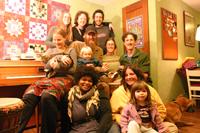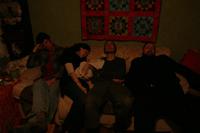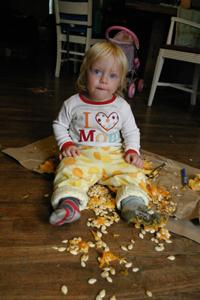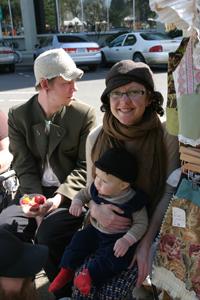
Most recent family photo: Back row: Jesika, Lali, Ja. Middle row: Valisa with Malia P., Benjah with Ash, Devon and Brian. Front row: Kiki, Renee with Alyssa, and Cassie the dog. (Not pictured: Discordia and Paul.)
Author: Jesika Feather
Published in Communities Magazine Issue #146
I stood in the bathroom; a sake cup filled with urine in one hand and a positive pregnancy test in the other. My first thought was, “Wow. This is kind of exciting.” My second thought was, “Oh no! I didn’t ask permission!” (to have a baby, or to pee in Valise’s sake cup).
My community makes decisions by consensus and, at the last house meeting, “baby having” was not an item on the agenda. In fact, “baby having” has never been on the agenda.
This was happening at an awkward time. After renting together for a year, we’d finally managed to buy a house. We’d moved in a few weeks prior—hadn’t even used up all the toilet paper the old owners left in the bathroom. All of a sudden I would have to introduce this addendum involving creamed peas and footie pajamas. This was NOT what everyone had signed up for, and backing out, at this point, would be a very difficult procedure. After all, we’d just signed official paperwork in offices called “suites,” witnessed by men in suits and women with frosted hair.
In our community founding meetings we tried really hard to predict every imaginable hardship: the roof caving in, economic crisis, and unfavorable personality transformations. We deliberated all this and more, yet the pregnancy scenario never made it to the table.
Why didn’t I ever bring it up? Benjah and I had been married for almost 10 years. We didn’t imagine this happening so soon, but we knew there’d be a baby at some point. Would it have been so terribly difficult to say, “How do y’all feel about living with a baby?”
Clearly, I was scared. Our community had never been what anyone would describe as… “family focused.” The majority of our time together was spent doing disaster relief in the Gulf Coast, after Hurricane Katrina. In that flurry of passion and social service, there was a general over-indulgence in many facets of life: hard work, miracles, ruckus, PTSD, and sewage…but never any babies.
Our list of communal strengths veered toward charisma, resourcefulness, and work ethic. Stability and structure? Not so much. I knew that my new community liked children, but I wasn’t at all sure how they felt about having one. Not only do babies add work and mess, but they carry a certain stigma. The toy farm strewn across the floor does not exactly set the tone for a night of lively debauchery.
When I finally broke the news (the next day), reactions ranged from ambivalence to a jig of joy. Mercifully, there was no bashing of fists upon tables or rending of paperwork. In my state of relief, I settled sweetly into a nine-month reverie, indulging all my fantasies of communal-child-rearing cloud nine.
Twelve years before, when Benjah and I first fell in love, we strolled the grounds of our college campus, hand-in-hand, philosophizing our 18-year-old brains out, mostly about communities and how “it takes a village.” These shared values have been the consistent unifying factor throughout our relationship.
By the time we got pregnant we’d lived in six very diverse communities and, over these 10 years, effectively eroded our youthful romanticized notions. We were proud of the fact that, in spite of the naysayers, we hadn’t become bitter or jaded. And, most importantly, we’d kept our marriage intact.
But once Ash was born, it became clear that despite those 10 humbling years of “teachable moments,” I’d sustained an unrelenting grip on some absurd expectations of communal families. My fantasies involved dozens of fat-legged toddlers scampering through acres of basil and butternut squash, wearing clover necklaces, harassing chickens, mimicking goats, and being nurtured by many mothers and fathers.
That vision was a far cry from our seven-bedroom home in Eugene, Oregon, where our predominant garden space is on the roof and I was definitely the only mama. It didn’t matter that the facts didn’t match my fantasy. My faith was not swayed.
During my eighth month of pregnancy one of my co-workers asked me what I planned to do for childcare.
“I live in a community,” I told her, as though that explained it all.
“So, they’re gonna watch your baby while you’re at work?” she asked me.
“Of course!” I replied, self-assuredly. “That’s why I live in a community.”
“Don’t they have jobs?” she asked.
“There’s always somebody at home,” I answered flippantly.
“How much are you going to pay them?”
I shrugged. Admittedly, I hadn’t considered this. Were my housemates going to charge me for childcare? “I don’t think I’ll have to pay that much,” I said.
“You’re lucky,” she said. “Childcare breaks me every month.”
I left work that day feeling very superior to all those non-communal folks, passing off their babies to daycares, emptying their bank accounts each month. Community, I thought, is a kind of insurance…so many people around to help you out.
With one month left of my maternity leave, the dismal truth began to emerge. Yes, I live with a bunch of people—a bunch of busy people who already work more than one full-time job. Simply planning a monthly house meeting takes about 30 minutes of compromise and usually results in someone stomping out for a consolatory cigarette.
Did I think that once Ash was born they were all going to white out their day planners and sit expectantly at my feet, waiting for their child-care assignments? “And don’t worry about paying us, Jes. It’s on the house.”
“Oh, by the way, does anyone know where all those goats and chickens came from? The ones wearing clover necklaces in the front yard?”
The truth is, they did help me out. They re-arranged their work schedules to help me keep Ash home for the first year-and-a-half of his life. They even took pay cuts, working fewer hours at their higher paying jobs to babysit Ash at a rate that was (temporarily) affordable to me. It was exceptionally generous of them and energetically draining for us all. Jimmy-rigging the communal schedule started to feel like a daily project. Eventually, in the name of household sanity, I had to suck it up and take Ash to a daycare.
These early, fantasy-shattering days were not particularly graceful ones. Far from emanating any sort of “maternal glow,” my new-mommy aura was composed of paranoia and self-consciousness. Something like a resurgence of adolescence.
I couldn’t figure out what “being a mother” meant in terms of my identity as an individual or as a member of this community. I realized that I felt a responsibility, as the only mother in my community, to embody my new maternal role in a graceful, goddess-like manner. I had ulterior motives. I wanted others in my community to have children. Therefore, this process needed to look fun and personally fulfilling. I was determined to participate actively in my community, maintain my love life, excel at my job, and present an air of solid unaffectedness: “It’s cool. I’ve got a baby now. So what?”
I know what you’re thinking: “Get real woman. Child and graceful don’t even belong in the same sentence!” Needless to say, I haven’t been particularly successful at my goal.
During the first month of Ash’s life, we experienced nursing problems. The birth center issued me an industrial breast pump which I was told to use every three hours around the clock. In between pumping I nursed Ash and sanitized the equipment. This generally left me a two-hour slot in which to sleep and eat before beginning the process over again. This lasted an entire month.
Breast feeding in public has never bothered me. However, sitting bare chested with both tits plugged into milking funnels is not sexy. Nor does it depict the graceful poise of a nurturing mother. It calls to mind a cow in a milking factory. I was exhausted. I had a huge post-natal belly. I felt totally incompetent as a friend, a wife, a community member, and a mother. For two days I attempted to cloister this undignified ritual to the bedroom but, because it represented one-third of my life, I eventually gave up. I held council with my housemates, random guests, and coworkers, while my boobs stretched back and forth like a good ol’ fashioned toffee pull.
The whole ordeal made for interesting conversation, which was good, because the events of my daily life did not.
My housemates bustled through the periphery of my life with news of their Frisbee tournaments, their wildcrafting expeditions, and their fashion shows. My greatest fear was being asked the question, “What did you do today?”
My gig was off. I was most definitely not proving that “babies don’t change anything.”
All I wanted in the whole entire world was to live alone. I wanted to focus on Ash without enduring the self-imposed guilt of not pulling my weight in this community and the humiliation of my new, monotonous life. Also, I felt sad for Ash. This time was supposed to be about him. Never in my life had I been this obsessed about other people’s judgments, not even in middle school. Why on earth was this happening now?
Thankfully, things got better. Sleeping helped. Speaking honestly about my insecurities helped also. Now that Ash is a-year-and-a-half old, I’ve gained some helpful perspective. Asking myself to give my entire life to a child I met yesterday, and to enjoy it, was unrealistic. Asking myself to endure that gracefully in front of seven other people was insanely idealistic.
I’m also learning that to maintain a strong nuclear family within a communal family, it is vital to wield a healthy sense of prioritization. This is not a trait that comes naturally to me.
My husband and I each have more than one job. It was hard to find quality time before Ash was born. Now that our parallel home-hours are spent convincing Ash to eat “one more bite of oatmeal” or to break-dance for the visitors, we get about five “alone” hours a week. These hours are stolen between 11 p.m. and 2 a.m. and, since Ash doesn’t sleep through the night, they are destined for interruption.
We delicately distribute these scant hours between house cleaning, my writing, Benjah’s lesson planning, love making, bills, and—oh yeah—sleep.
Wouldn’t it be nice if our priorities aligned? They don’t. Let’s add another time-consuming activity to the list: argument.
The following is a common 11 p.m. interaction:
Benjah is reading on his side of the bed. We both cringe at the abrupt smack of released suction as I try, for the fourth time, to withdraw my nipple from Ash’s pursed lips. Benjah and I freeze in silent prayer as Ash (eyes still closed) tosses from one side to the other. He murmurs and then lets out a high-pitched cry. Benjah and I lock eyes. Mine is an expression of resigned defeat; Benjah mouths, “Sorry.”
But wait… Ash quiets. He stops moving. Relief washes over me. Oh glory be, blessed church of autonomy, you are my new religion. I can move. I can take a shower. I can drink a cup of tea. My two-foot, cute-as-all-git-out, sucker-demon is finally unconscious. My head is reeling with opportunity…for about 30 seconds. Then I remember it’s my night to do the dishes.
ARRRRRGGGGG! I have to do it. In the last house meeting we made a commitment: we would not go to bed with a dirty kitchen. I lie still, contemplating my options (or lack thereof). I glance over at Benjah. He’s looking at me with…yes…unmistakably hungry eyes.
How will I break this terrible news? Now he’s leaning over to kiss me and all I can think about is the horrible, crusty lasagna dish on the counter. Has it even started soaking?
I summon the memory of every interaction I’ve had with Benjah over the last 14 years and try to perfect my tone, word choice, and energetic vibration so that he will acquiesce with my insufferable request.
I return his kiss and say, “So, do you wanna hang out in the kitchen while we finish those dishes real quick?”
He’s not stupid. He knows about the lasagna pan. He also knows that the dishwasher is full of clean dishes which will have to be unloaded and that I could get detail-oriented with the counters. I watch him wilt.
Can you blame him? He’s being prioritized under dishes (something that he doesn’t fail to bring to my attention).
But it’s not really about the dishes. I could never be classified as a clean freak. Our bedroom looks like we have some kind of moral agenda against open space. There are at least 50 books on the floor, an overturned child’s shopping cart, seven pairs of shoes, the directions to our new thermometer, a crossword puzzle, dirty clothes and clean clothes (intermingled), bills, unfinished sewing projects, and a grocery bag full of mismatched socks. Clearly, I’m not jeopardizing my sex-life in the name of order. I’m just trying to maintain our community standards.
But maybe I don’t have my priorities straight. I consider this as I scour Pyrex, a sullen Benjah unloading the dishwasher at my side. Am I taking my husband’s unconditional, time-honored love for granted? Do I incessantly place him behind the needs of this newer, shakier relationship—my community? Will I eventually do the same thing to my son? Should I bring this up in therapy?
Obviously, if we lived by ourselves, we could just forget these damn dishes—guilt-free. So why, exactly, am I still here?
Now that we’ve survived Ash’s infancy, I can take a step back and acknowledge that this community’s “family focus” should not be defined by the number of free child-care hours that I receive. We do each other’s dishes, we snuggle on the couch, and we fight over who gets a shower before the hot water runs out. What else distinguishes a family?
When I was two days into my labor and my belly-dance moves were no longer effectively soothing the contractions, they circled around me, singing my favorite songs as I gyrated my hips with tears running down my face. I knew then, even in the face of my two greatest fears—shitting all over the midwife and begging wretchedly for an epidural—that I desperately wanted every one of them in the room during Ash’s birth.
My commitment to this community is obviously a marriage of love…not of convenience. Someday there might be goats, butternut squashes, and 15 other kids. Right now, I’ll just appreciate what I’ve got. I do, however, have a brand new fantasy: when Ash goes to pre-school and they ask him to draw his family picture, I really hope it includes us all.
















ss834
I loved this article! I live in a smaller community that is mostly my immediate family and childcare is a BIG issue. It changes things dramatically. However, we’re getting along well and it’s great to read how others have adapted to the unique challenges of raising children.